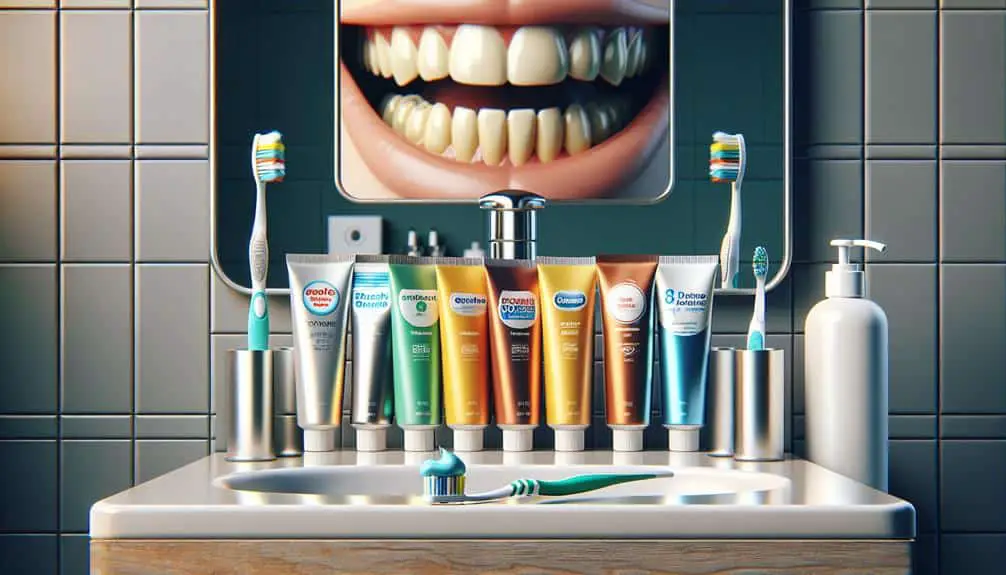To effectively whiten your yellow teeth, charcoal powder offers a vital solution. It absorbs toxins and impurities, aids in teeth whitening, and gently removes surface stains for a brighter smile. By wetting your toothbrush, dipping it into charcoal powder, and brushing gently in small circular motions, you can achieve desired results. Remember to be cautious about potential side effects and use a soft-bristled toothbrush for best results. Following up with regular dental care is essential. Maintain your bright smile by continuing proper oral hygiene practices.
Key Points
- Charcoal powder naturally whitens teeth by absorbing toxins and surface stains.
- Its gentle abrasion helps remove plaque and brightens teeth effectively.
- Use charcoal powder with caution to prevent tooth sensitivity and enamel damage.
- Follow proper usage steps like gentle brushing and rinsing thoroughly.
- Maintain results with regular dental care, brushing, flossing, and avoiding teeth-staining foods.
Benefits of Using Charcoal Powder
When whitening yellow teeth, using charcoal powder can offer a natural and effective solution.
Charcoal powder is gaining popularity as a natural remedy for oral hygiene due to its ability to absorb toxins and impurities, helping to whiten teeth in the process. Unlike traditional whitening treatments that may contain harsh chemicals, charcoal powder provides a gentle alternative for those seeking a more natural approach to oral care.
One of the key benefits of using charcoal powder is its ability to remove surface stains from the teeth, resulting in a brighter and whiter smile. By gently exfoliating the teeth, charcoal powder can help to break down plaque and tartar buildup, promoting overall oral hygiene. Additionally, charcoal powder can help balance the pH levels in the mouth, creating an environment less conducive to bacteria growth.
Incorporating charcoal powder into your oral hygiene routine can be a simple and effective way to maintain a healthy and radiant smile using natural remedies.
How Charcoal Powder Works
Charcoal powder works by adsorbing impurities and toxins from the teeth, aiding in naturally whitening and brightening your smile. When considering the effectiveness of charcoal powder for teeth whitening, it's crucial to comprehend its mechanism of action. Here's how it works:
- Adsorption: Charcoal has a porous surface that attracts and binds with impurities, including surface stains on the teeth, leading to a brighter appearance.
- Gentle Abrasion: The fine particles in charcoal powder can gently polish the teeth, helping to remove plaque and surface stains without causing damage to the enamel.
- Antibacterial Properties: Charcoal possesses antibacterial properties that can help reduce harmful bacteria in the mouth, contributing to overall oral health.
While charcoal powder can be effective in whitening teeth, there are some risks to be aware of, such as potential tooth sensitivity. To prevent this, it's advisable to use charcoal powder in moderation and follow up with appropriate dental care.
Steps for Using Charcoal Powder
To effectively use charcoal powder for whitening yellow teeth, follow these step-by-step instructions.
Begin by wetting your toothbrush and dipping it into the charcoal powder. Make sure to use a soft-bristled toothbrush to prevent abrasion to your enamel. Gently brush your teeth in small, circular motions for about two minutes, ensuring that all surfaces are covered. Pay extra attention to areas where stains are prominent. Be cautious around the gum line to avoid gum irritation.
When brushing with charcoal powder, maintain a gentle pressure to prevent damaging your enamel and causing tooth sensitivity. After brushing, spit out the charcoal mixture and rinse your mouth thoroughly with water. Follow up by brushing your teeth with regular toothpaste to remove any residual charcoal particles and to freshen your breath.
Precautions When Using Charcoal Powder
As you use charcoal powder for whitening yellow teeth, it's important to be mindful of certain precautions to guarantee safe and effective results. Here are some key points to keep in mind:
- Potential Side Effects: While charcoal powder is generally safe for most people, some may experience side effects such as increased tooth sensitivity or gum irritation. If you notice any adverse effects, discontinue use and consult your dentist.
- Application Technique: To maximize the benefits of charcoal powder and minimize the risk of damage, make sure you use a soft-bristled toothbrush and gentle, circular motions when brushing. Avoid aggressive scrubbing, as this can wear down enamel and harm your gums.
- Rinse Thoroughly: After brushing with charcoal powder, make sure to rinse your mouth thoroughly to remove any residue. Leaving charcoal particles in your mouth can lead to staining or discomfort. Additionally, follow up with regular toothpaste to make sure all charcoal remnants are removed.
Maintenance Tips After Whitening
Implementing proper oral hygiene practices post-whitening is important to maintain the results and guarantee long-lasting effects on your teeth. After whitening your teeth with charcoal powder, it's essential to follow a consistent post whitening care routine.
To start, continue to brush your teeth at least twice a day using a fluoride toothpaste to remove surface stains and prevent new discoloration. Flossing daily is also crucial to remove plaque and debris from between your teeth. Consider using a whitening mouthwash to help maintain your bright smile and kill bacteria that can cause staining.
Furthermore, it's advisable to avoid foods and drinks that are known to stain teeth, such as coffee, tea, red wine, and berries. If you do consume these items, rinse your mouth with water afterwards. Regular dental check-ups and professional cleanings are essential to monitor your oral health and remove any stubborn stains.
Frequently Asked Questions
Can Charcoal Powder Be Used on Sensitive Teeth?
If you have sensitive teeth, sensitivity management is crucial when considering using charcoal powder for whitening. Explore alternative whitening methods like gentle toothpaste or professional treatments. Consult your dentist for personalized advice.
How Often Should Charcoal Powder Be Used to See Results?
For best results in whitening yellow teeth with charcoal powder, use it consistently. Most users start noticing improvements after 2 weeks of daily use. Remember, frequency and consistency are key to achieving a brighter smile.
Is It Safe to Use Charcoal Powder if You Have Dental Work Such as Crowns or Veneers?
If you have dental work like crowns or veneers, be cautious when using charcoal powder. It may be abrasive and potentially damage dental implants or fillings. Consult your dentist for specific precautions to protect your dental work.
Will Using Charcoal Powder Cause Teeth Sensitivity?
Using charcoal powder can indeed cause teeth sensitivity. Despite claims of whitening benefits, it can strip away enamel, leading to sensitivity issues. Protect your teeth by opting for gentler whitening methods and consulting a dentist for advice.
Are There Any Long-Term Effects of Using Charcoal Powder for Whitening?
Using charcoal powder for teeth whitening may have potential risks on your dental health. Long-term effects could include enamel damage and increased tooth sensitivity. Seek advice from a dentist before using to guarantee safety.
Conclusion
To sum up, utilizing charcoal powder to whiten yellow teeth can be a cost-effective and natural alternative to traditional whitening methods.
Studies have demonstrated that activated charcoal can efficiently eliminate stains and toxins from the teeth, resulting in a brighter smile.
With proper precautions and maintenance, you can attain a whiter smile without the use of harsh chemicals.
Consider giving charcoal powder a try and witness the difference for yourself.



